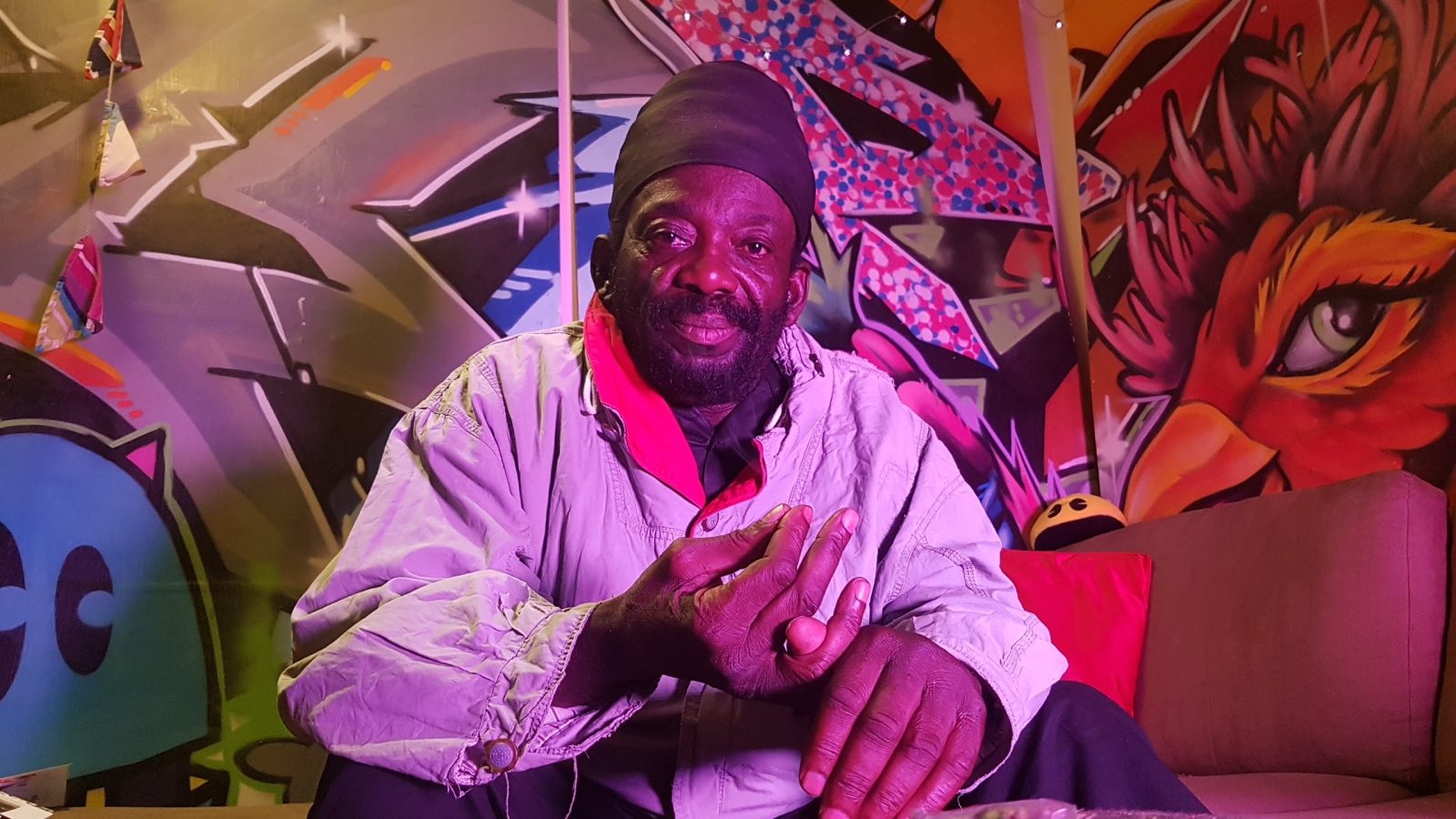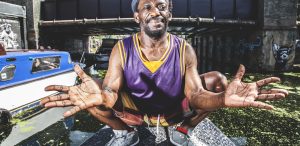
Like the great Caribbean writer C.R.L. James, Bonjo Iyabinghi Noah finds life to be analogous to test match cricket. ‘You lick the ball before you lick the wicket and if you make fifty, you can put your bat up’ he once prudently observed. He is a thoughtful, compassionate and inspirational artist – as wise to music’s remedial powers as he is the nuances of ‘the game of gloriously uncertainty’. Since the early eighties, he has collaborated with producer Adrian Sherwood and host of talented musicians, to create the bold and expressive music of African Head Charge. His spiritual drumming and moving melodies have contributed to the music’s endurance, alongside Sherwood’s inimitable, futuristic production. But his own musical roots go back further: To Nigeria, Fela Kuti and The Funkees – the musicians who he tells us, gave him the name ‘Bonjo’ and taught him a great deal.
He has spent the last six months recharging in Ghana – continuing to learning and to teach his compatriots. He returns to England prepared for his forthcoming shows, which contain hitherto unseen audio-visuals and promise to be a life-affirming experience! We had the privilege of interviewing Bonjo ahead of the African Head Charge show at Band on the Wall on 1st April, discussing his musical history, new live show and his relationship with the drums.
How has touring and live performance changed since the early days of On-U sound, when roster artists would often appear on the same bill and line-ups could be interchangeable? Looking back to those days, what do you feel now were the pivotal moments in the development of yourself and the label?
‘In those days, around about ‘81 when I released the first album “My Life in a Hole in the Ground” – and even before that – as a member of Creation Rebel, backing Prince Far I and other Jamaican artists…it was really Prince Far I that got Adrian [Sherwood] into mixing. We collaborated with each and everyone and would contribute – even if it wasn’t by playing – just sitting and talking! In some way, we would touch each other. It was experimental, the whole thing with On-U Sound – especially in the early days! We would go in the studio and sometimes I’d have ideas, other times I’d just say “forget that” and go and do something new!
I remember one time, this great Jamaican drummer named Style Scott came over here. We’re in the studio and just start to jam with each other… and the good thing about Adrian is, as soon as we start playing, he’d start recording. Even if I’m just testing my drums or practising, he may be recording! So a lot of the creativity came out of those things. I feel glad that I was there from that time, to have been a part of that collective!
After Creation Rebel stopped working, I wanted to do something different. I’m talking about taking my drums in the studio, laying them out all over the place…playing one thing, laying a foundation and building on top of that.
We supported each others projects. Foxy Mus’come [aka. Eskimo Fox] – he was a drummer in Creation Rebel and invited me to the band. That’s when I met Adrian and all these different people I didn’t know – so I would go in there [the studio] with my vibes – the “poco” and “nyabinghi” and they’d love it!
Touring is something that I love to do. I’ve been all over the place and I love the festivals – when the music brings people together. I love meeting new people, touching new people – I believe that one day though, I will slow down… I’ve been touring for 40 years!’
You’ve been working on a new live set for your forthcoming shows. Has it been challenging pulling the new show together and what can Manchester fans expect from the audio and visual components?
‘Although I’m the spiritual leader for this thing, we have other people around, working closely with African Head Charge. We’ve all put our heads together, rehearsed, come up with something new and I feel excited about it. We’re coming in with some visuals now and taking it to another level again! We’re going to be playing some tunes that we’ve never played live before, so when you come to see an African Head Charge show now, you’re not just hearing the music, you’re seeing a story. There are certain songs that we’ll never stop doing, like “Somebody Touch I”, “Wicked Kingdom” and “You Learn”…plus we’re doing “Free Chant, Churchical Chant Of The Iyabinghi” – a song we’ve never done before [live] and I’m excited to do!’
Trevor Jackson selected several African Head Charge tracks for his acclaimed 2015 compilation Science Fiction Dancehall Classics. Did Jackson speak to you about his selections prior to the release and what are your thoughts about the underlying concept for his compilation?
‘Today is the first time I’ve heard it, but for me: if something that we’ve done can be used to make people happy, that’s very good. I didn’t really know about it, I don’t really check the computer or use the internet – but if people want to take my work and do what they want to do, I don’t really make a big fuss out of it! For me, it [the music] wasn’t anything to do with Science Fiction, it was just something internal that came out. But if that’s how people hear it, that’s great too.’
As a percussionist and hand drummer, do your instruments have extra musical significance to you? Do you play for purposes other than writing, recording and performing and do have any particular philosophies about the drums and how they fit into your life and music?
‘I had a good friend named Keith Jones and he had a wife who was a nurse. Keith liked to go and play his guitar in places to entertain people, in hospitals and such, so I used to go with him. He took me to the hospital where his wife was working and we started to play. There was a man who was unresponsive and as we started to play the rhythm: the man started to move his toes. And I remember the doctor coming and saying “we’ve been doing all kinds of things to get this man to move”…it’s a serious thing! I start to look at the drums not just as an instrument, a serious thing and a spiritual thing.
From being a child, I always liked making drums. We’d get the tin, the cloth and some putty, put it in the sun, put ashes on it and… [mimicking drum tones] we have a little drum! My Mum always wanted me to play in our church, “Nazareth assemble”, but my Grandmother had a Rasta camp and would draw me there! I’d want to go to the “poco” church, which is the spiritual church, where the proper African thing g’warn. So to me, the drums are medicine and health is my wealth!’
Artists such as Pat Thomas and Ebo Taylor will have been many British’s listener’s first inroads into Ghanaian music, but there’s a great deal more music to discover. Do you have any recommendations for lesser-known Ghanaian or West African artists to check out or that are making especially progressive music?
‘My first artists that I love in Africa, not Ghana but Africa, was Fela Kuti. Of course Pat Thomas and Ebo Taylor…but right now in Ghana, big up the place, is a guy called Stonebwoy and another called Shatta Wale. They are the biggest thing in Ghana right now. I’m talking about right now. Before that, we had Amakye Dede. Amakye Dede still is one of my favourites, doing ‘highlife’, which is the music of the country. Also, my sons, Irie Jay and Zighie Bonjo are very talented, then my daughter, with her spoken word, she surprised me! I took her to the studio the other day…my children in Africa are very talented, they can dance…and Ghanaian people know how to dance!’
You’ve been involved in the creation of so much music during your lifetime and much of it significant or groundbreaking for several reasons. When you look back, what stands out for you? Are there any pieces of work that you feel encapsulate your artistic vision or that have gained significance for you over the years?
A group of them have their own character – “Wicked Kingdom”, “Holy Selassie I”, “Stand Firm” – so much music, so maybe it’s a good thing that we’re doing now, bringing out this music that we don’t [ordinarily] do live. Going to Japan, I really loved that experience. I really love that country: what I saw were people that were humble and “irie”, y’know!
I don’t think I’ll ever stop recording – even if I’m in Africa – not only myself but other people too. I know for a fact that I want to spend a lot of time in Ghana. I want to live there, but come her [to England] sometimes and do some good work! That’s what my future is – I’ll never stop working live, but I want to spend more time there, in West Africa. At the moment I’m in a place called Bolgatanga in the North and I like it there. I like how the people respect each other and so forth.
The greatest thing for me is knowing that, over the last forty years or so, we’ve been putting down a lot of drumming and a lot of people are sampling it now. Using it for what they’ve been doing. I don’t know if there are a lot of Conga players who’ve led a band before. The only [other] conga player I know that has been a band leader is Mongo Santamaria, then Count Ossie, a drummer and leader of the Mystic Revelation of Rastafari. We surprised a lot of people, leading with a drummer…that’s something I’m really happy about and I give Jah thanks every day about that!
I think I’m overrated. I’ve seen some great drummers in Africa and when I go over there, I humble myself with them. The only thing between me and them, is I have the wide variety of styles…the mento, calypso, nyabinghi, the poco…but when it comes the specialist drumming, they’re doing things I don’t do! I can do some of it, but they are masters! They grow up in it, learn it like a language. Once you can communicate with that language, it becomes something great! It’s evolution…maybe in three of four years time, we’ll take African Head Charge to another level again!’
African Head Charge + DJ Nick Sinna (NTS radio) are live at Band on the Wall on 1st April 2018.



